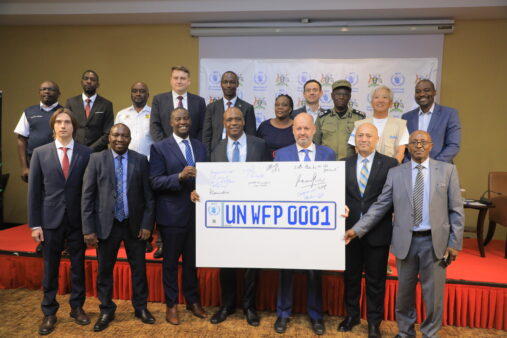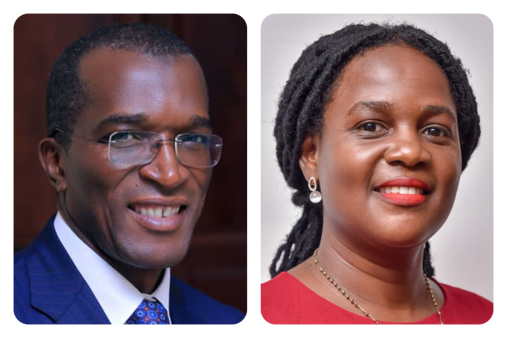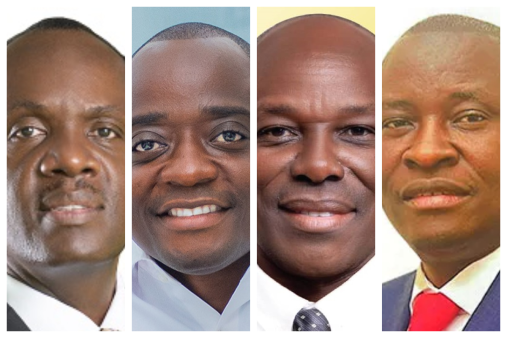Tourism is one of my favourite topics as EU Ambassador to Uganda. Together with coffee, renewable energy, and some others, it has very positive connotations—and also synergies. Who cannot be happy when you think of tourism? It creates jobs, which is one of the priorities in the EU-Uganda partnership.
My claim to fame here is that I am both a tourist, a host and a development partner. As a diplomat in a country, you are a bit of a tourist, and you understand what tourists want. I see myself a bit like a mirror for you, to reflect with and understand how you are perceived. And let me come back to this – it is important. Then I am also a host of many friends who come here to visit me and become tourists. This will not even be a blip in the Ugandan tourist statistics, but it means I have a good idea of what the country can offer.
And lastly we as the EU have invested quite a lot in Uganda’s tourism industry, not least historically in the national parks and recently together with UDB in providing support and recovery for hotels and tour operators during COVID. We invested EUR6 million in this and helped 120 facilities to survive during the pandemic.
Let me start by being a bit philosophical… When I heard about the theme of the today, I was a bit puzzled – tourism and peace – is it not a bit far-fetched combination…? And is it not a bit sensitive and counterproductive to discuss security threats, conflict and negative travel advice? But the more I thought of it, the more relevant it seemed. And equally important, it signalled something to me. That is, that Uganda has started to look at how the country is perceived in other parts of the world, also beyond the tourist attractions themselves, the wildlife, the parks and the lodges.
I think this is hugely important. European countries do this all the time. For us it has even become an end in itself, to be positively perceived. But it of course reflects back on our ambition to export our products and to invite tourists – because in order to attract tourists, you need to have a positive image, a good reputation. This includes, of course, peace, but also many other things, including, for example, how you manage epidemics, like now MPox, or more importantly, how you treat sexual minorities – a topic I think affects Uganda’s reputation in the West even more than the peace and conflict aspects. But that is for another discussion. Anyhow, my message is one of appreciation. Congratulations on having the bravery to encourage discussions on this delicate theme. And please continue investing in your image and how Uganda is perceived abroad.
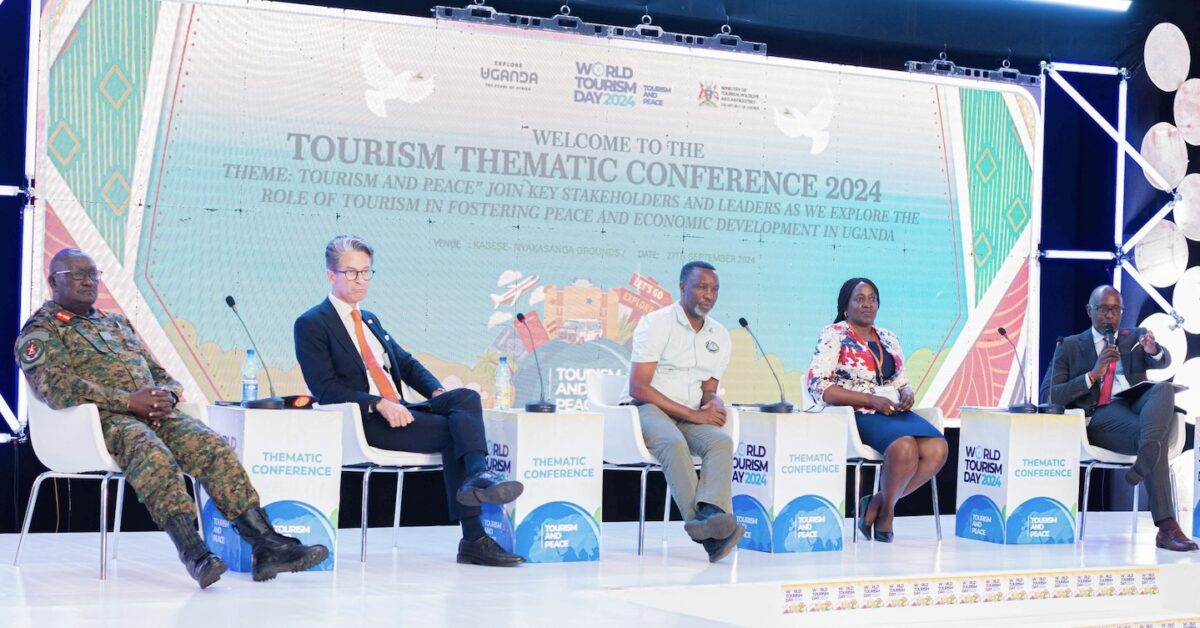
Ladies and gentlemen, I am told that one-fourth of the world’s population lives in areas affected in one way or another by conflict. Those areas keep changing, sometimes all of a sudden, and of course, it affects the destinations chosen for tourism and leisure. Look for example at recent events in the world that have greatly affected the tourism map, like for example, the Arab Spring and subsequent instability in countries like Egypt and Tunisia, which had tourism as a major economic contributor to their economies, even higher than the average 10% of the global GDP around the world. I was in Cairo as a tourist at that time and it was really sad to see the empty hotels and resorts.
It’s obvious to everyone that peace is a prerequisite for the success of tourism, but let me add that the perception of “peace” is as important as the factual and real peace in a country. If we look at the Global Peace Index (GPI) on levels of violent crime, political instability, access to weapons, and many other parameters, Uganda ranks 126 out of 163 countries. Interestingly, we observe that some countries more “insecure” than Uganda, for example Ecuador and Brazil in South America (with lower ranking, 130 and 131) have much more appeal and tourism business than the Pearl of Africa.
It happens that even after conflicts end, countries often struggle to rebuild their international image, deterring tourists for years or decades. Perceptions of insecurity are difficult to shake off, and countries may suffer long-term declines in tourism revenue.
It is for Uganda to find out if it has to do with marketing, or with media coverage, history or stereotypes but if you allow me to be frank and honest, I am afraid Uganda is still slightly burdened with a negative perception from the outside, at least for many in the Europeans. It seems to me, that often when I tell friends and people at home, they think first of Idi Amin, then of the Anti-Homosexuality Act – and only then about the gorillas and other positive things.
I realize it might be like swearing in church, but some other countries emerging from conflict have better come around their tragic history and transformed their narrative into peace tourism initiatives where tourists visit places that emphasise reconciliation, conflict resolution, and historical lessons about peace. I am thinking about e.g., Rwanda’s genocide memorials or South Africa’s apartheid history tours.
That’s not to say that we have to work only on perceptions. Ensuring the safety and security of tourists is paramount. Uganda should prioritize anti-terrorism and anti-poaching initiatives, as well as improve the country’s overall security infrastructure to protect tourists and tourist sites, and we have to applaud UPDF, and UPF for their efforts to keep the country safe and a beacon of peace in a region clouded by instability.
But when foreign tourists come to Uganda and hire a trek or a nature tour in or out of the national parks and see that they have to be accompanied by someone armed with assault weapons, they may be under the impression that they are at risk or that something is wrong. Compared with the rangers in Tanzania or Kenya, our UWA rangers are one of the most militarised in the region. Again, I am talking about a balancing act between real peace and perception of peace. Something for Uganda to consider.
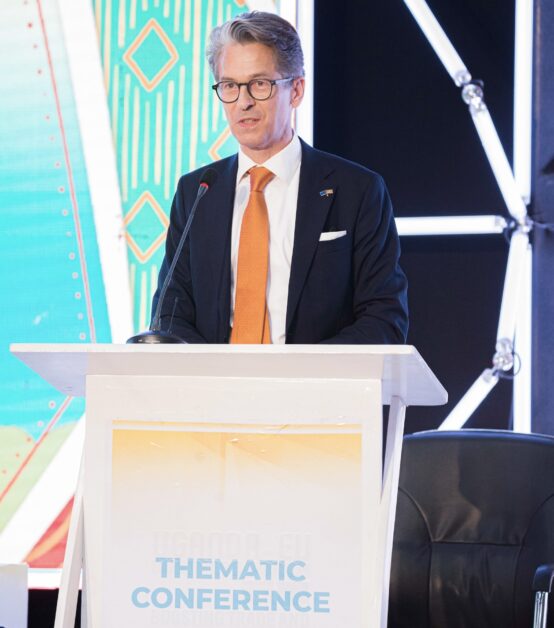
I want to address another angle. Mark Twain said it very well: “Travel is fatal to prejudice, bigotry, and narrow-mindedness, and many of our people need it sorely on these accounts. Broad, wholesome, charitable views of men and things cannot be acquired by vegetating in one little corner of the earth all one’s lifetime.” It means that peace is not simply the absence of war or conflict; it is the presence of tolerance, acceptance of love and understanding, and a positive force of social cohesion and understanding. That’s where tourism can play a role.
Tourism is about connecting people with each other and with the Planet. When you travel with a gentle heart and an open mind, you discover that the differences that seemingly divide us pale into insignificance before all the common needs, aspirations and desires that are universal across nations, races, religions or gender and sexual identities. We all share the same ideals, hopes and aspirations and travel teaches us that diversity is no need for antagonism. In this way especially domestic tourism and tourism between neighbours can play a role for peace here in Uganda and the region.
I already mentioned, but let me stress it again, tourism not only can bring peace but also prosperity. Tourism offers great opportunities for emerging economies and developing countries. It creates jobs, strengthens the local economy and contributes to infrastructure development; it can help to conserve the natural environment, cultural assets and traditions, to reduce poverty and inequality and to heal the wounds of conflict. It is an industry that has a cascading and multiplier effect on many other industries, thereby providing a major boost to the economy.
The economic aspect and effect of tourism has been well documented – It accounts for almost 10% of global GDP and employs 1 in 10 persons of the labour force in the world.
If allowed, let me add that the next step is also to educate the travellers, to awaken them to the higher paradigm of tourism. If they are travelling to a new place, we need to sensitise them to the social and cultural differences, we need to create experiences and situations where they can interact positively with the local host community, we need to encourage them to buy local products, try local food.
From the feedback I have received from my exchanges with European companies working in tourism in Uganda, the first and foremost feature that they express again and again, and that it excels all other countries where they work, is not the nature, accommodation, services or facilities, but the people of Uganda. Their character, hospitality, demeanour, kindness, welcoming attitude and engagement person-to-person.
For you living in Uganda, it may be taken for granted that the great majority of people in Uganda are decent and considerate, but for outsiders who have travelled worldwide and can compare, they all praise Uganda’s character and charm. It is an asset that has not been gazetted, but I tell you, broadly appreciated by all who visit Uganda.
Let me add that the EU and its member States are fully committed to supporting the tourism and hospitality sector in Uganda. To that purpose, I would like to announce an incoming programme for EUR 10 million with the objectives to:
- Increase Uganda’s visibility and attractiveness as a sustainable travel destination.
- Increase local communities’ participation in and benefits from tourism
- A facility to provide competitive conditions for access to finance for the private sector working in tourism
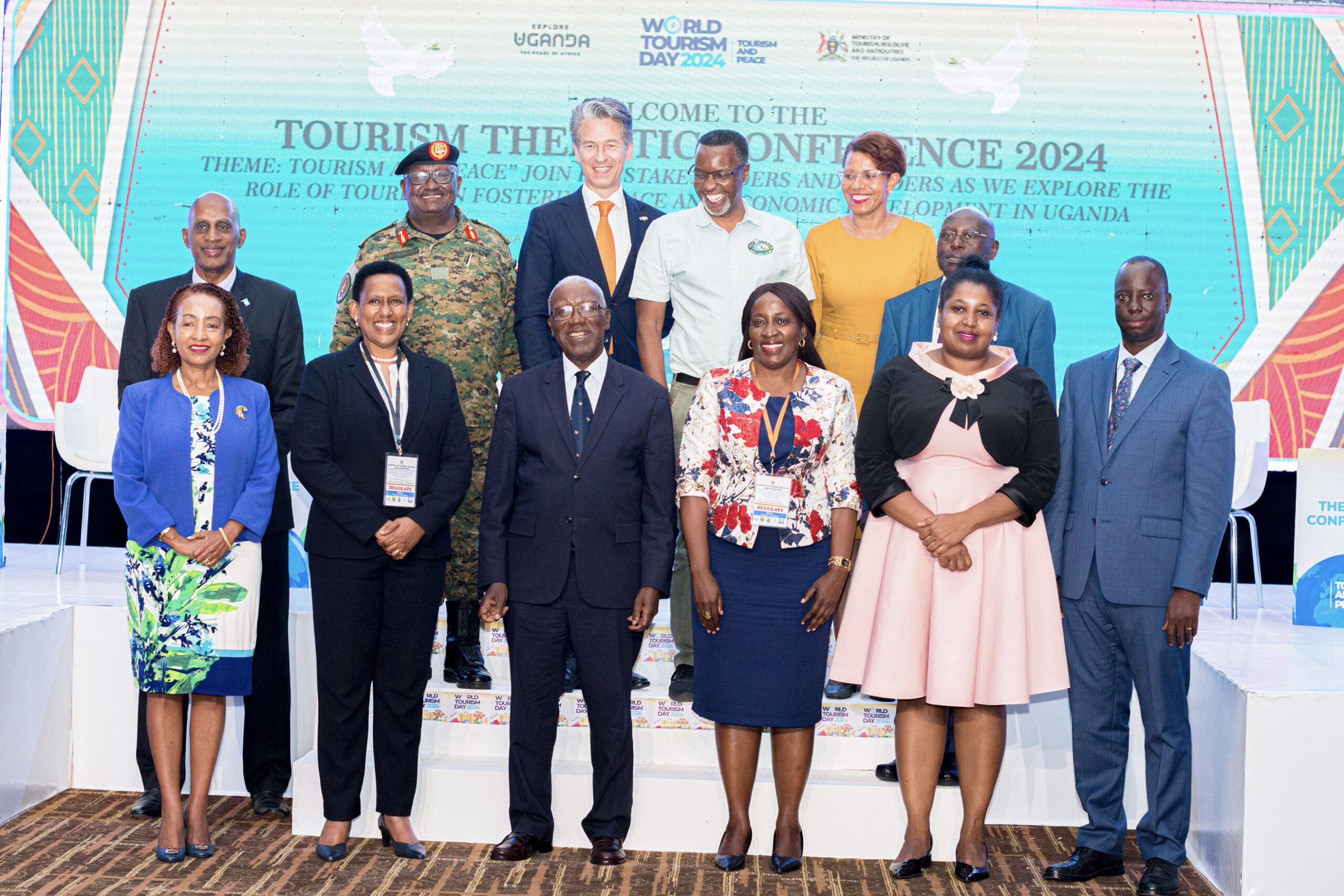
 Vodacom Tanzania's Philip Besiimire’s Three-Year Scorecard: Growth, Discipline, and Dividends
Vodacom Tanzania's Philip Besiimire’s Three-Year Scorecard: Growth, Discipline, and Dividends